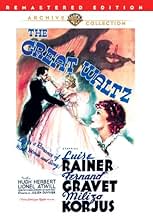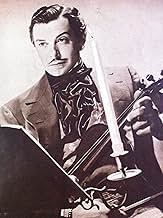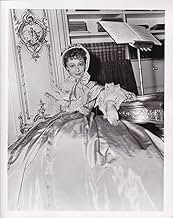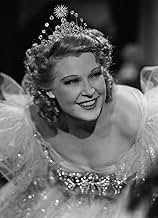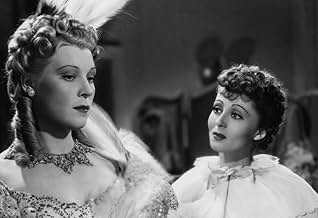Aggiungi una trama nella tua linguaJohann Strauss II pursues his passion for waltzes in 1845 Vienna, facing societal resistance. His music gains popularity through opera singers, leading to fame and personal conflicts between... Leggi tuttoJohann Strauss II pursues his passion for waltzes in 1845 Vienna, facing societal resistance. His music gains popularity through opera singers, leading to fame and personal conflicts between his wife and a passionate affair.Johann Strauss II pursues his passion for waltzes in 1845 Vienna, facing societal resistance. His music gains popularity through opera singers, leading to fame and personal conflicts between his wife and a passionate affair.
- Regia
- Sceneggiatura
- Star
- Vincitore di 1 Oscar
- 2 vittorie e 3 candidature totali
- Johann Strauss
- (as Fernand Gravet)
- Wertheimer
- (as Sig Rumann)
- Revolutionary
- (non citato nei titoli originali)
Recensioni in evidenza
Miss Rainer's charms elude me. She was pretty and not a bad actress by any means and yet the clammy, self-congratulatory air of masochism and eye-brimming sadness of each of her performances is hard to take. Even when you have to admit that she isn't bad in a given scene, she is insufferable, sometimes almost unwatchable. And she had her most cringing, masochistic and melodramatic role in this picture as the long-suffering wife of a faithless Strauss as played by a puffy Fernand Gravey.
It is Gravey and Miliza Korjus that are the real stars of the film, and this is curious to a modern viewer since neither had the classic good looks of movie stars of the period. What they did have was a stars' confidence and because of the considerable imagination of Julien Duvivier, you believe them as a romantic couple and as stars intoxicated with their own love and talent.
But what is impressive about THE GREAT WALTZ is the way Duvivier transforms potentially dull and static numbers into surreal flights of fantasy. He isn't afraid to be delirious or silly so a few set-pieces unexpectedly catch your attention, make you laugh and then impress you with their theatricality and verve. Such is the orgasmic waltz sequence that takes place in and around a bandstand in the Vienna Woods in which Korjus decisively seduces Gravey. It is Duvivier's attention to detail that makes it: the way Korjus jackknifes to the ground in Gravey's arms and removes her organdy picture hat, the gorgeous line of trees hung with Japanese lanterns on a moonlit set, the way she staggers and tumbles onto the grass after her trilling climax, inviting greater liberties (despite the all-girl orchestra looking on), all of these images make the scene breathless, ludicrous, memorable.
And just because we have blessedly forgotten Strauss's dreary wife, Duvivier concocts a spectacular scene for Rainer too: publicly confronted by her husband's faithlessness, she hurriedly dresses in silks and crinolines determined to kill herself or someone else on the night of his opera debut. Sweeping out of their huge house and down their long staircase to the strains of a waltz, sweeping into a baroque opera house and up an even longer set of steps, she stops, awestruck while several jump cuts reveal the enormity and grandeur of the theatre, the rapt audience and the triumph of her rival, who defiantly swirls into a lavish stage waltz. In contrast, Rainer's smiling-through-tears routine afterward seems an anti-climax, though it is an admirable piece of showmanship and hugely entertaining despite a shrill note of barely controlled hysteria she has cultivated throughout the sequence. Or maybe because of it. Rainer's few strengths as an actress are utterly linked to her considerable weaknesses.
So I'm now not surprised to learn of this film's great success at the time, though I do wonder why the Mac-Eddy productions never got as creative a craftsman as Duvivier to plan and film their pictures. If he had they might be more widely admired today beyond the group of fast-ageing fans who first loved them in the '30s. But maybe nothing can revive interest in this most unfashionable of movie genres.
Swirling waltzes are captured with such superb angles in the Oscar-winning camerawork, it's no wonder David O. Selznick was impressed enough to insist that his own technical staff derive inspiration from viewing the film.
Soprano Miliza Korjus does some excellent trills as the operatic diva who steals Strauss from his wife (temporarily) until the obligatory happy ending. Luise Rainer suffers gracefully (in an insufferable role as the wife!!) and Fernand Gravet does well as the composer. His scenes with Miliza Korjus are what makes the film the gem that it is. She all but steals the film and was nominated for a Supporting Actress Oscar and then disappeared from the American scene, returning to Europe to resume her operatic career.
"The Great Waltz" was a fine example of what M. Duvivier could do. This glorious 1938 MGM film was one of the most loved films of that period. Not only that, but even if the subject matter, Johann Strauss' life was not accurate, at least his great music is heard in the film. The exquisite art direction Cedric Gibbons gave the picture and the beautiful costumes from Adrian made this a favorite of the movie going public of that time.
The life of the struggling musician who had a lot of talent, but whose music was a departure from what has been heard in Vienna before him, was something movies loved to tell. Whether or not this was a true account of the composer's life, it's still a visually rich film.
Fernand Fravey as Strauss gives a good performance. Luise Ranier makes the suffering and self-sacrificing Poldi, one of her best creations. The true star of the film though, is Milizia Korjus, who as the gorgeous soprano Carla Donner steals the show with her singing and her looks. Hugh Herbert, Alma Kruger, Curt Bois, and the rest of the cast do great work for Julien Duvivier.
"The Great Waltz" is a film that's not seen often these days and it's a shame because it's an excellent excuse for going back to that period and the great music Strauss gave to the world.
Lo sapevi?
- QuizToscha Seidel, the Russian virtuoso violinist, was hired especially to dub the solos on the soundtrack for Johann Strauss (Fernand Gravey) and began a new career working as a concert master at MGM and other studios.
- Citazioni
Johann 'Schani' Strauss II: Thanks for firing me, Mr. Wertheimer. Goodbye, you worms!
- ConnessioniFeatured in Another Romance of Celluloid (1938)
- Colonne sonoreTales From the Vienna Woods, Op.325
(1868) (uncredited)
Music by Johann Strauss
Lyrics by Oscar Hammerstein II
Hummed by Fernand Gravey as it is being composed
Sung by Miliza Korjus
Played as background music often
I più visti
- How long is The Great Waltz?Powered by Alexa
Dettagli
- Tempo di esecuzione1 ora 44 minuti
- Colore
- Proporzioni
- 1.37 : 1


